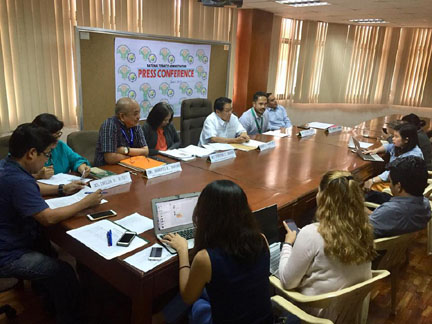News Articles
PH seeks bigger tobacco export amidst declining local demand
 |
| PRESSCON. Administrator Robert L. Seares speaks with members of the media covering the Department of Agriculture during a press conference at the NTA Central Office Con-ference Room in Quezon City. The Administrator and other senior officials answer questions from the Agri beat reporters on tobacco industry updates, excise tax, and other issues and concerns of the industry. The senior officials present are Deputy Administrator Atty. Mel John I. Verzosa, Atty. Rohbert A. Ambros of the Regulation Department, Fortuna C. Benosa of the CorPlan Department, Dr. Roberto R. Bonoan of the Industrial Research Department, and Imelda N. Riñen of the Farm Technology and Services Department. (Melanie Rapiz-Parel) |
AS the nationwide smoking ban in public places and newly imposed tax hike continued to pull down demand for local tobacco, NTA is now concentrating on the production of leaf tobacco for export.
In a press conference held at the NTA Central Office in Quezon City, NTA Administrator Robert L. Seares said that this move is expected to cushion the effect of the ban on the tobacco farmers' income.
The strict nationwide smoking ban, per Executive Order No. 6 issued by President Rodrigo R. Duterte in May last year, which prohibits smoking in public places, further reduced cigarette consumption and impacted tobacco leaf output.
"The agency is now focused on cultivating tobacco leaves for export and as substitutes for blending tobacco being imported for domestic manufacturing, as this will also help tobacco farmers stay afloat amid the declining demand," he said.
In domestic manufacturing, uncertainty also looms. Due to the passage of the Tax Reform for Acceleration and Inclusion (TRAIN) law, a pack of cigarettes is now P5 more expensive than the retail price of P30 in 2017. This will be followed by a series of lower rate increases until 2024.
After this period, the annual 4% increase mandated by Republic Act 10351 or the Sin Tax Reform Law becomes operational again.
According to Regulation Department Manager Atty. Rohbert A. Ambros, there is really lower local demand but the agency hopes to compensate it with the exports.
Reduced production
From the production of 48.22 million kilograms (kg) of all types of tobacco in 2017, the output this year is only seen at 40 million kg.
According to Administrator Seares, the spiraling impact of the ban and increased taxes in the domestic tobacco sector has caused local leaf production sliding down to 40 million kg, compared with 48.22 million kg—valued at P3.65 billion—in 2017.
This will cause the number of farmers and areas planted to tobacco to drop, "which have been decreasing in the last three years by 17 percent and 15 percent, respectively," he said.
Based on the NTA's 2013-2017 data, the number of tobacco farmers and areas plunged by 40 percent from 53,959 to 34,465, and 43 percent from 37,021 to 22,704 hectares, respectively.
The volume and value of tobacco production also fell by 30 percent from 68 million kg to 48 million kg, and 21 percent from P4.67 billion to P3.65 billion, respectively.
According to Administrator Seares, the decision of farmers to shift to other crops may be temporary, as they always come back after a year or two, reportedly because of lack of production support, small markets, and unstable prices for other crops.
Total Contract Growing
As NTA pushes for exports, the agency continues the strict implementation of the Total Tobacco Contract Growing System, which will address both volume and quality requirement for domestic manufacturing and for export based on Purchase Commitment to be submitted by tobacco companies starting tobacco season 2018 to 2019.
"We have to invest on provision of production assistance and inputs to tobacco farmers for shifting towards topped tobacco production, irrigation facilities, and flue-curing barns for Virginia and air-curing sheds for burley and native tobacco, among others," Deputy Administrator for Operations Atty. Mel John I. Verzosa said.
NTA will assist farmers, especially those without marketing agreements with companies, on economically sustainable, market-driven, and high-value crops and livelihood activities, Verzosa added. (Neyo E. Valdez)






